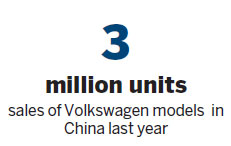VW 'back on track' thanks to record 2016 sales
By Hao Yan (China Daily Europe) Updated: 2017-03-26 11:16Positive 2016 sales results have given Volkswagen Group new momentum, thanks to its speedy expansion in the Chinese market. But the automaker also reported shrinking profits as heated competition dragged down prices.
Despite its ongoing diesel emissions issues, the carmaker set a new record for deliveries in 2016. It exceeded expectations by selling 10.3 million vehicles worldwide, including 4 million in China, a 12.2 percent increase from the previous year.
"Last year was a challenging yet remarkably successful year for us," said Matthias Muller, CEO of Volkswagen, at the 2016 annual financial statement presentation in Wolfsburg, Germany, on Mar 14.
"In 2016 we set our course for the biggest transformation in the history of the company, while at the same time performing better in our operating business than many thought possible. Volkswagen is back on track."
In order to accomplish its long-term goal of becoming one of the world's leading providers of sustainable mobility, the group launched its Together-Strategy 2025 future program in 2016.
Sales of Volkswagen models rose 14 percent in China to 3 million units in 2016. Audi sales edged up 3.6 percent to 591,554 units and Skoda sales increased by 12.6 percent to 317,100 units. Meanwhile, luxury cars continued to post strong growth. Porsche sales went up 12.5 percent to 65,200 units during the same period.
Jochem Heizmann, president and CEO of Volkswagen China, says, "China's auto sales growth in 2016 has exceeded our expectation and long-term plan."
Although it posted sales revenues of 217.3 billion euros ($234.1 billion; 188.8 billion), the German company saw a minor decline in its Chinese joint ventures, which were impacted negatively by exchange rate effects.
An auto analyst at an international consultancy, who spoke on condition of anonymity, says, "Volkswagen was slow in bringing its SUVs to the world's largest market, where customers have been turning to SUVs over the past several years."

The Chinese SUV market surged by 45.7 percent to post nearly 9.2 million units in 2016, growing three times faster than the overall rate of expansion for passenger cars. But only two SUV models carrying Volkswagen badges are currently in the Chinese market - the Tiguan, which is locally produced by SAIC Volkswagen, and the imported Touareg. SAIC Volkswagen is also offering its Yeti, a third SUV under the Skoda brand, which is also localized.
In contrast, FAW-Volkswagen Automobile's Audi division stepped on the accelerator in SUV production by launching its Audi Q7, Q5 and Q3 models. It is set to localize the compact Q2 model for a younger generation in Guangdong province, while a Q plant is under construction for the next-generation Q5.
"SUVs have higher prices than the sedans on the same platform. The market has accepted and settled into this pattern, so the segment generates much more substantial profit for a carmaker," the analyst says.
The premium brand's achievement set another annual record for the premium segment in China, while the Audi Q5 topped the premium midsize SUV market.
At 59.3 billion euros, Audi's 2016 sales revenue exceeded the previous year's figure by 900 million euros.
The automaker witnessed its global sales rise by 3.6 percent year-on-year to around 1.9 million cars in 2016, maintaining a worldwide demand increase for the seventh year in a row since 2009.
"The Audi division has its own management system that runs well as a department under FAW-Volkswagen," the analyst says.
- 'Cooperation is complementary'
- Worldwide manhunt nets 50th fugitive
- China-Japan meet seeks cooperation
- Agency ensuring natural gas supply
- Global manhunt sees China catch its 50th fugitive
- Call for 'Red Boat Spirit' a noble goal, official says
- China 'open to world' of foreign talent
- Free trade studies agreed on as Li meets with Canadian PM Trudeau
- Emojis on austerity rules from top anti-graft authority go viral
- Xi: All aboard internet express











